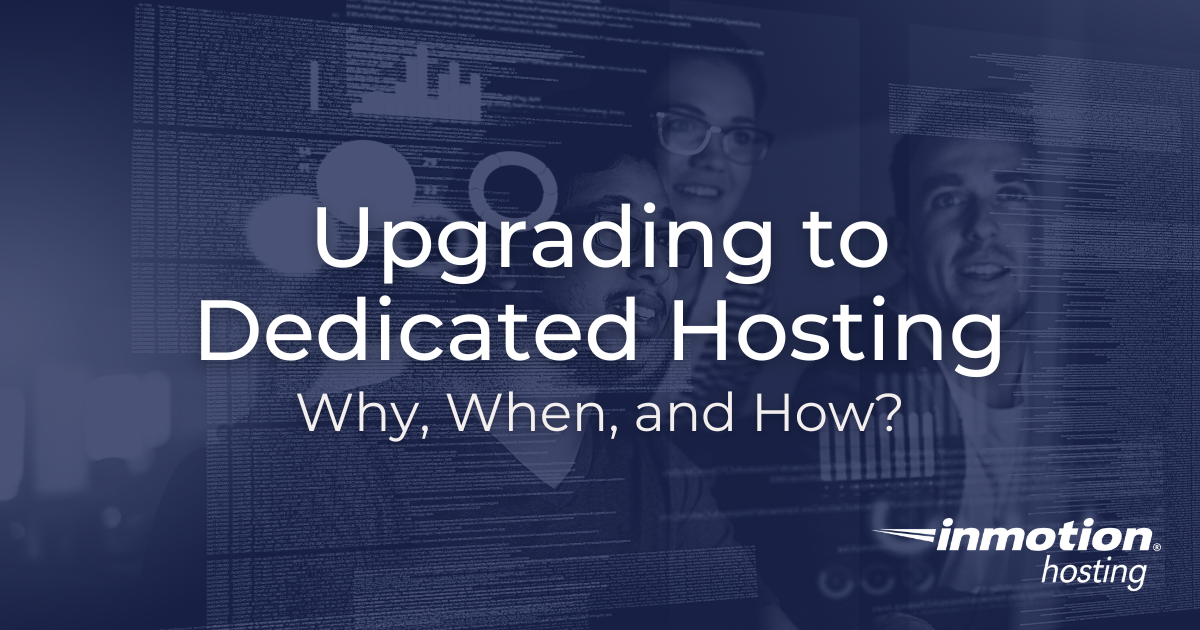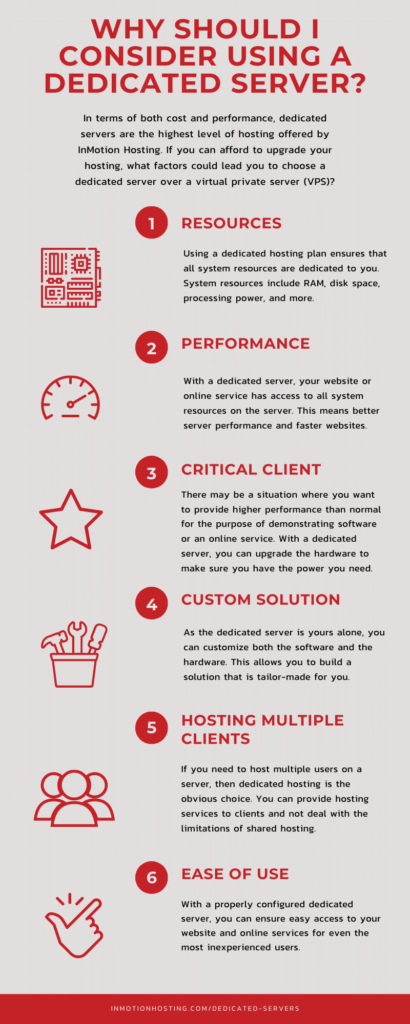
Before upgrading to dedicated hosting, it is important to consider a few different concepts. What do you plan to use the server for? Where you want your data center to be? How do you know if dedicated server hosting is right for you? These are all questions that need to be answered before you can begin the upgrade process. In this article, we will discuss uses of dedicated hosting, the importance of data center location, and aspects to consider when looking to upgrade your hosting.
Topics Include:
- 5 Uses for Upgrading to Dedicated Hosting
- Importance of Data Center Location
- Benefits of Upgrading a Dedicated Hosting Server
- Is Upgrading to Dedicated Hosting Right For You?
Scale your business with high-performance dedicated hosting. Choose from Managed Dedicated Servers powered by cPanel, or select a Bare Metal Server for complete server control via the command line.
DDoS Protection
99.99% Uptime
Software RAID
New Customer Discounts
5 Uses For Upgrading to Dedicated Hosting
Here are some of the popular uses for dedicated hosting.
Website Hosting
When it comes to uses for a dedicated server, website hosting tops the list. Dedicated servers help your audience get to your website more quickly. In contrast to lesser website hosting plans like shared hosting and VPS Hosting, a dedicated server will provide high-performance speed and stability for your website’s visitors.
Game Server Hosting
Whether you’re a hardcore gamer or are just looking for a way to play with your friends, you can use a dedicated server to host a multiplayer game. Not only does this allow for 24/7 uptime and the ability for your friends to join even when you leave, but it also allows your international friends to participate in the game. These servers often become monetized and often use pay-as-you-go or subscription systems.
Virtual Private Networks (VPNs)
Virtual Private Networks, more commonly known as VPNs, are useful when you want to keep information secure and only available to specific devices. Only specific computers can connect to each other and the server, so data can’t be accessed without going through one of those computers. This provides increased security and prevents hacking.
Data Syncing
Very similar to a VPN, you can upload files onto the dedicated server so that every device connected can access them. These are typically handled via a cloud network, but as with VPNs, files are more secure thanks to the fact that only specific devices can connect to the server. The primary difference between Data Syncing and a Virtual Private Network is that a VPN is used to connect computers, whereas Data Syncing allows files to be stored in one area for future use (almost like a cabinet).
Communication Services
Email is typically sent through computers across the internet, leaving it open for interception. With a dedicated server, you can send IRC messages, or Internet Relay Chat messages, to any device connected to that network. Because it’s a dedicated server, you can encrypt messages and keep them away from the public. This is also useful if you own a business and don’t want employees using their work email for personal matters. A dedicated server owner can regulate how networked devices receive and send messages—like email or other forms of communication.
Importance of Data Center Location
With the power of modern servers and Internet data speeds, something like the geographical location of a server may seem trivial. After all, data zips across the Internet so quickly that location may not seem to matter. Despite the relatively high speed of the modern Internet, users can still experience lag when they try to access data over great distances. This lag becomes particularly pronounced in situations where the user and the server exchange a great deal of information, such as in a mobile app setting.
In many cases, it might be wise to have servers in multiple locations. This approach makes sense for those serving data to users in different vicinities. It also serves as a means of risk management by keeping redundant data and processes on Dedicated Servers in geographically distant locations. If something happens to one server (natural disaster, power outage, etc.) the other can take over.
Where are Your Users?
Obviously, budget and operating requirements must factor into your decision. But, would it be better for your operational goals to explore colocation (i.e., having servers in multiple locations)? Or, does having just one, ideally located server better suit your objectives and budget? Will you need top-of-the-line specifications, or should you go for solid entry or mid-range servers in multiple locations?
The answers to some of these questions pertain to your intended use for the dedicated server. For example, a mail server should probably run close to the pool of users that will access it. On the other hand, most customers do not need top-level hardware simply to run a mail server. As a result, it may be possible to purchase hosting for two or more such servers on different coasts. The resulting reduction in lag for users could easily speed up their email delivery times. In fact, the gains could well exceed those resulting from higher-end hardware in a more distant Data Center. Multiple server locations could also create backup redundancy for security and ensure continued operation even in the event another server suffers a failure.
Alternatively, those needing dedicated servers for mobile app infrastructure may want servers located as close as possible to their user base. If data reveals that the majority of users live on the US East Coast or in Europe, having a dedicated server located on the East Coast with the highest available specifications may provide the best user experience. On the other hand, if the majority of users live on the US West Coast, Asia, Australia, or somewhere in the Pacific region, a West Coast server could be key.
InMotion Hosting now offers Data Centers located on both the US East and West Coasts. These Data Centers also allow a choice of different server configurations to suit most operational needs.

Benefits of Upgrading to a Dedicated Hosting Server
In the process of justifying a dedicated hosting solution, you may often develop very specific reasons for upgrading. However, it’s also very important to remember the broader picture and the overall effect of using a server where all the resources are focused on your needs.
Time, money, control, and security are often big concerns that can be considered across departments of your organization. Purchasing a dedicated server or using a dedicated server from a hosting company can affect the time it takes for your internal and external customers to complete their work. This in turn affects the money involved in both operations and sales. You also have control of both the operating environment and the security that you may need for the server.
Small- to medium-sized businesses (SMBs) would be more affected by the expenditure of using a dedicated server. However, these costs can be justified in the growth of the business and also by using server leases or managed services from hosting companies to help with server management.
In some cases, the technical skills for updates or upgrades may not be available to these businesses without considerable cost. The use of managed services can help to provide the IT staff and be available for rapid incident responses to keep things running smoothly.
When it comes to upgrading to a dedicated server, you would also benefit from a hosted solution as they could provide server migration services.
Is Upgrading to Managed Dedicated Hosting Right For You?
Businesses shouldn’t be afraid of upgrading to dedicated hosting. In fact, there are many advantages to doing just that. But it is important to find the right managed platform for your needs and to do your research before you make a commitment. Read on for some advantages of managed dedicated server hosting.
Software Updates
One of the first things that you can quit worrying about with managed dedicated server hosting is the need to run regular updates on software, including critical components like software RAID. There are constant updates and patches issued by software companies that can repair vulnerabilities in a program. Some of these vulnerabilities could leave your website open to hackers looking to crash your system or steal your data. But if you have a managed dedicated server, your hosting service will run all these updates for you to ensure that your website has the most current software available.
Hardware Maintenance
Software is not the only thing that needs to be repaired and updated regularly. Your physical server needs regular maintenance to work at an optimum level, much like a car. Most of us would have no idea what to do if our server crashed, other than to call tech support and pray that they can fix it. But, with a managed server, your hosting company will make sure that your physical server is working well so that you have a high uptime. This means that your website will not crash, or if it does, it will be brought back online as quickly as possible.
Data Protection
Imagine that something dramatic happens to your server and it crashes taking with it not only every file on your website, but also every single piece of customer data that you have accumulated over the years. With a managed server, your hosting company will schedule regular back-ups that you don’t have to worry about. If your website does crash, they can then restore your data almost instantly and your site will hardly miss a beat as it gets back online. And then, you won’t have to recreate your customer data from scratch.
Web Traffic
Unfortunately, sometimes too much web traffic can be a bad thing. Traffic spikes can create a bottleneck that slows down your website’s speed, making it harder for the pages to load, which in turn will ultimately drive your visitors away because they think that something is wrong with the site. Managed servers are monitored to ensure that such traffic spikes can be handled without causing major problems with your website.
Security
Hacking is a major issue that every website owner and operator has to worry about. On a shared server, your security can be compromised by an unsecured website on the same server. Once hackers get into that site, they can use the server as a means to attack yours. However, with a dedicated server, you don’t have to worry about that as you are the only one on the server. If your server is managed, then you know that your site will be regularly scanned for viruses and malware and that it will be protected from DDoS attacks and other hacks.
Technical Support
Lastly, a managed dedicated server can save you money in the long run because you don’t have to keep a full IT person on standby to maintain your website. Instead, your managed server host will provide technical support 24/7. They can also assist if there are problems with the server or if you need design help and other technical questions about your site itself.
Conclusion
With all of this information to consider, hopefully you are closer to deciding whether or not upgrading to dedicated hosting is right for you. Dedicated hosting can be a powerful resource for your web hosting experience, giving you more tools and options than any other type of hosting available.
Looking for information about dedicated hosting? Check out our recent upgrades to our dedicated server platforms!
Ready to purchase? All Dedicated Server plans include a new customer discount. Claim your deal now, and experience superior Dedicated Hosting performance with InMotion Hosting.